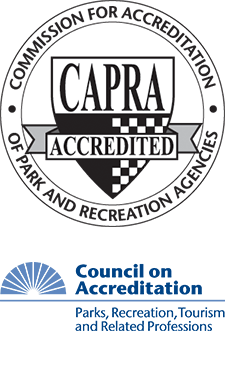 NRPA’s accreditation programs celebrated two milestones in 2014. The Commission for Accreditation of Park and Recreation Agencies (CAPRA) celebrated its 20th anniversary, while the Council on Accreditation Parks, Recreation, Tourism and Related Professions (COAPRT) celebrated its 40th anniversary.
NRPA’s accreditation programs celebrated two milestones in 2014. The Commission for Accreditation of Park and Recreation Agencies (CAPRA) celebrated its 20th anniversary, while the Council on Accreditation Parks, Recreation, Tourism and Related Professions (COAPRT) celebrated its 40th anniversary.
CAPRA, which implements and administers the agency accreditation process, was established in 1993, and the first six agencies were accredited in 1994. Five of those initial agencies were granted continuing accreditation at the 2014 CAPRA hearings. Enjoying 20 years of CAPRA accreditation are: City of Scottsdale Parks and Recreation in Arizona; Parish of East Baton Rouge (BREC) Recreation and Park Commission in Louisiana; City of Roseville Parks and Recreation in Minnesota; Monmouth County Park System in New Jersey; and City of Plano Parks and Recreation in Texas.
“As we have reached our 20th year, CAPRA is now more important than ever,” says Sara Hensley, park and recreation director for Austin, Texas, and CAPRA chair. “It is imperative that city and county park and recreation agencies, as well as park districts, continue to show the essential nature of what we do. Agency accreditation is a huge factor in not only best practices development and operations, but it assists with articulation of our importance to a community.”
The CAPRA standards provide an authoritative assessment tool for agencies. CAPRA accreditation assures that an accredited park and recreation agency has been independently evaluated against established benchmarks as delivering a high level of quality. Each agency’s accreditation is revisited every five years. Within each of the four years between onsite visits, the agency will submit an annual report that addresses its continued compliance with the accreditation standards. Currently there are 135 accredited agencies.
The Council on Accreditation was formed in 1974 and changed its name to the Council on Accreditation Parks, Recreation, Tourism and Related Professions (COAPRT) in 2009. Accreditation is granted to an institution or a program that meets or exceeds stated criteria of educational quality. Accreditation has two fundamental purposes: to assure program quality and assist in program improvement. A further benefit to the accredited program is broader recognition in the academic community and the professional field. COAPRT is recognized by the Council for Higher Education Accreditation (CHEA), an accrediting body for higher education.
The Council held its first meeting in October 1974. Recreation and park educators and practitioners had been working on the development of a plan and evaluative criteria for many years. This development included a trial run and evaluation of the process at four institutions. The first program to be accredited was North Carolina State University’s Department of Recreation Resources Administration in 1977. Currently there are 81 accredited programs.
North Carolina State University Associate Professor Candace Vick recently stated, “As we celebrate our 40th year, undergraduate program accreditation is as relevant as ever. COAPRT accreditation provides a rigorous, consistent and comprehensive process ensuring students, families, employers and the public that those enrolled in accredited parks, recreation, tourism, recreation therapy and related programs are provided a quality education. COAPRT accreditation continues to be a mark of excellence.”
Brenda Beales is NRPA’s Awards and Accreditation Manager.

